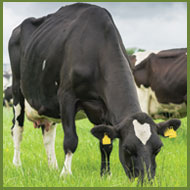Farmers urged to check cattle for summer mastitis

"It is essential stockpeople pay careful attention when checking cows" - Dr Basil Lowman.
Farmers are being urged to check their cattle following reports of large numbers of summer mastitis cases.
Senior beef expert Dr Basil Lowman at Scotland’s Rural College (SRUC) said: “In most parts of the country it has been an exceptional year for grass growth, but this unfortunately means it has also been an exceptional year for flies – the carriers of summer mastitis.
“Although everyone is flat out trying to bring in the harvest, it is essential stockpeople pay careful attention when checking cows.
He continued: “Animals away from the main group, hungry calves, and swollen teats and udders, are obvious signs of a problem which needs immediate investigation, as the earlier the problem is identified, the greater the chance of saving the area.”
Dr Lowman said the animals at most risk are dry cows. However, because infection levels are so high this year, they can become susceptible to mastitis within two to three months of calving.
“The most important thing to do is to graze susceptible animals in exposed fields away from trees and open water where flies breed,” he said.
He added that teat sealants, Stockholm tar, fly spray, insecticide ear tags or garlic can all be used to prevent flies settling on cattle.
Once summer mastitis occurs in cattle, the level of infection carried by flies rises significantly as they land on infected areas and fly to nearby cows.
“The best way to avoid this is to bring all infected cows indoors, which will be necessary in any case if they are to be treated,” said Dr Lowman.



 The veterinary mental health charity Vetlife is inviting the veterinary community to join it for a sponsored cold-water dip.
The veterinary mental health charity Vetlife is inviting the veterinary community to join it for a sponsored cold-water dip.